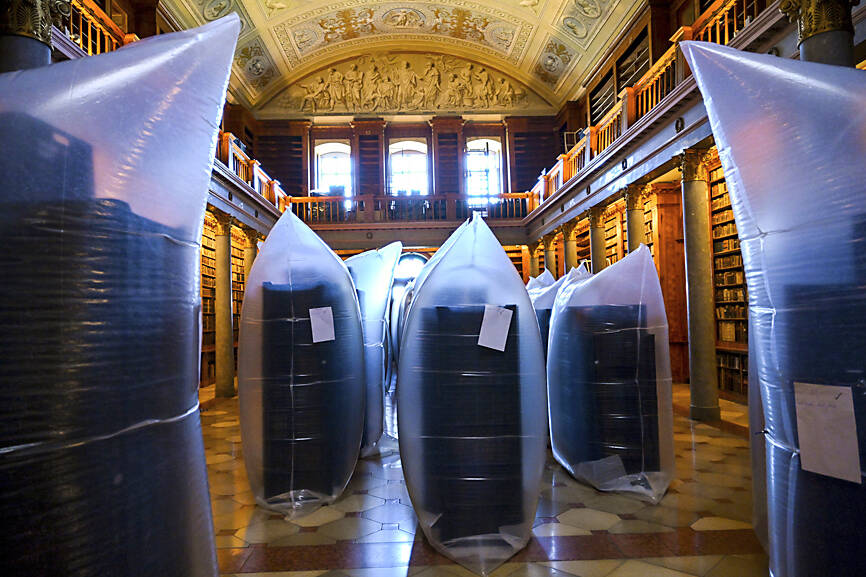Tens of thousands of centuries-old books are being pulled from the shelves of a medieval abbey in Hungary in an effort to save them from a beetle infestation that could wipe out centuries of history.
The 1,000-year-old Pannonhalma Archabbey is a sprawling Benedictine monastery that is one of Hungary’s oldest centers of learning and a UNESCO World Heritage site.
Restoration workers are removing about 100,000 handbound books from their shelves and carefully placing them in crates, the start of a disinfection process that aims to kill the tiny beetles burrowed into them.

Photo: AP / Pannonhalma Archabbey
The drugstore beetle, also known as the bread beetle, is often found among dried foodstuffs such as grains, flour and spices. However, they are also attracted to the gelatin and starch-based adhesives found in books. They have been found in a section of the library housing about one-quarter of the abbey’s 400,000 volumes.
“This is an advanced insect infestation which has been detected in several parts of the library, so the entire collection is classified as infected and must be treated all at the same time,” said Zsofia Edit Hajdu, the chief restorer on the project. “We’ve never encountered such a degree of infection before.”
The beetle invasion was first detected during a routine library cleaning. Employees noticed unusual layers of dust on the shelves and then saw that holes had been burrowed into some of the book spines. Upon opening the volumes, burrow holes could be seen in the paper where the beetles chewed through.

Photo: Pannonhalma Archabbey via AP
The abbey at Pannonhalma was founded in 996, four years before the establishment of the Kingdom of Hungary. Sitting upon a tall hill in northwestern Hungary, the abbey houses the country’s oldest collection of books, as well as many of its earliest and most important written records.
For more than 1,000 years, the abbey has been among the most prominent religious and cultural sites in Hungary and all of central Europe, surviving centuries of wars and foreign incursions, such as the Ottoman invasion and occupation of Hungary in the 16th century.
Ilona Asvanyi, director of the Pannonhalma Archabbey library, said she is “humbled” by the historical and cultural treasures the collection holds whenever she enters.
“It is dizzying to think that there was a library here a thousand years ago, and that we are the keepers of the first book catalogue in Hungary,” she said.
Among the library’s most outstanding works are 19 codices, including a complete Bible from the 13th century. It also houses several hundred manuscripts predating the invention of the printing press in the mid-15th century and tens of thousands of books from the 16th century.
While the oldest and rarest prints and books are stored separately and have not been infected, Asvanyi said that any damage to the collection represents a blow to cultural, historical and religious heritage.
“When I see a book chewed up by a beetle or infected in any other way, I feel that no matter how many copies are published and how replaceable the book is, a piece of culture has been lost,” she said.
To kill the beetles, the crates of books are being placed into tall, hermetically sealed plastic sacks from which all oxygen is removed. After six weeks in the pure nitrogen environment, the abbey hopes all the beetles would be destroyed.
Before being reshelved, each book would be individually inspected and vacuumed. Any book damaged by the pests would be set aside for later restoration work.
The abbey, which hopes to reopen the library at the beginning of next year, believes the effects of climate change played a role in spurring the beetle infestation as average temperatures rise rapidly in Hungary.
Hajdu said higher temperatures have allowed the beetles to undergo several more development cycles annually than they could in cooler weather.
“Higher temperatures are favorable for the life of insects,” she said. “So far we’ve mostly dealt with mold damage in both depositories and in open collections. But now I think more and more insect infestations will appear due to global warming.”
The library’s director said life in a Benedictine abbey is governed by a set of rules in use for nearly 15 centuries, a code that obliges them to do everything possible to save its vast collection.
“It says in the Rule of Saint Benedict that all the property of the monastery should be considered as of the same value as the sacred vessel of the altar,” Asvanyi said. “I feel the responsibility of what this preservation and conservation really means.”

STEPPING UP: Diminished US polar science presence mean opportunities for the UK and other countries, although China or Russia might also fill that gap, a researcher said The UK’s flagship polar research vessel is to head to Antarctica next week to help advance dozens of climate change-linked science projects, as Western nations spearhead studies there while the US withdraws. The RRS Sir David Attenborough, a state-of-the-art ship named after the renowned British naturalist, would aid research on everything from “hunting underwater tsunamis” to tracking glacier melt and whale populations. Operated by the British Antarctic Survey (BAS), the country’s polar research institute, the 15,000-tonne icebreaker — boasting a helipad, and various laboratories and gadgetry — is pivotal to the UK’s efforts to assess climate change’s impact there. “The saying goes

FRUSTRATIONS: One in seven youths in China and Indonesia are unemployed, and many in the region are stuck in low-productivity jobs, the World Bank said Young people across Asia are struggling to find good jobs, with many stuck in low-productivity work that the World Bank said could strain social stability as frustrations fuel a global wave of youth-led protests. The bank highlighted a persistent gap between younger and more experienced workers across several Asian economies in a regional economic update released yesterday, noting that one in seven young people in China and Indonesia are unemployed. The share of people now vulnerable to falling into poverty is now larger than the middle class in most countries, it said. “The employment rate is generally high, but the young struggle to

ENERGY SHIFT: A report by Ember suggests it is possible for the world to wean off polluting sources of power, such as coal and gas, even as demand for electricity surges Worldwide solar and wind power generation has outpaced electricity demand this year, and for the first time on record, renewable energies combined generated more power than coal, a new analysis said. Global solar generation grew by a record 31 percent in the first half of the year, while wind generation grew 7.7 percent, according to the report by the energy think tank Ember, which was released after midnight yesterday. Solar and wind generation combined grew by more than 400 terawatt hours, which was more than the increase in overall global demand during the same period, it said. The findings suggest it is

Police in China detained dozens of pastors of one of its largest underground churches over the weekend, a church spokesperson and relatives said, in the biggest crackdown on Christians since 2018. The detentions, which come amid renewed China-US tensions after Beijing dramatically expanded rare earth export controls last week, drew condemnation from US Secretary of State Marco Rubio, who on Sunday called for the immediate release of the pastors. Pastor Jin Mingri (金明日), founder of Zion Church, an unofficial “house church” not sanctioned by the Chinese government, was detained at his home in the southern city of Beihai on Friday evening, said